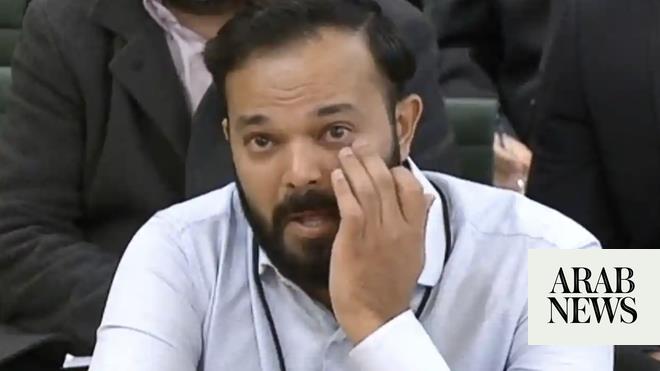
Yasin Patel said a tribunal investigating Yorkshire County Cricket Club’s handling of racism allegations has the potential to spark positive change within the sport
‘Embrace those who are with (the) change and take them with us on a journey — and those who aren’t, drag them there if need be,’ he added
LONDON: A shift toward an attitude of “get on board or get off” in relation to efforts to tackle racism in English cricket is inevitable, according to a leading sports lawyer.
For the latest updates, follow us on Twitter @ArabNewsSport
As a tribunal involving Yorkshire County Cricket Club continues this week, Yasin Patel, a renowned legal expert in the sport, media and entertainment sectors, told Arab News that he believes the outcome of the hearing has the potential to bring about positive change within the sport.
Yorkshire CCC and a “number of individuals,” including former England player Gary Ballance, have been charged by the England and Wales Cricket Board following an investigation into the club’s handling of complaints of racism made by former player Azeem Rafiq.
Pakistan-born off-spinner Rafiq first made allegations of racism and bullying in September 2020. They related to his two spells with Yorkshire, from 2008 to 2014 and 2016 to 2018.
Michael Vaughan, a former captain of England and Yorkshire, is testifying this week at the hearing in London, which continues until March 9. He denies allegations made against him by Rafiq of racism during his time leading Yorkshire.
The hearing is seen as a touchpaper moment for the English game and inclusivity, especially among the south Asian community in the UK.
Asked what outcome might be expected from the tribunal, Patel told Arab News: “Any guilty parties will need to partake in educational programs, which will inform them in terms of discrimination and racism, so that nothing like this happens again.”
If Vaughan, who retired from playing and has recently worked for several broadcasters as a commentator, is found guilty of using racial slurs, as is alleged, Patel said it should be very difficult for him to find work in the game.
“In light of what’s happened here, would you want him to be working for you?” Patel asked.
A much-anticipated, and delayed, Independent Commission for Equity in Cricket report is due to be published imminently. Patel believes it could reveal that the Yorkshire case is just the tip of the iceberg.
It could have ramifications for the game not only in England, he said, where it is expected to highlight thousands of cases of racism and discrimination, but all around the world, especially in predominantly white cricketing nations such as Australia, which has also been dogged by similar allegations.
Patel said the report will help to define the line between embedded institutional racism and everyday discrimination, while highlighting the type of slurs allegedly used by Vaughan and others against fellow players because of their race. Both forms of racism, institutional and casual, he said, are rife in cricket and need to be stamped out.
“Racism is (essentially about) power and politics so, using the Yorkshire criteria here, the board was primarily white, the supporters were primarily white, those who run the game are primarily white, the majority of the team were white and the captain was white,” Patel said.
“They have the power to make decisions, (albeit) with one or two small Asian minorities involved, but the (majority) has the power to do certain things and that’s the racism element. Unfortunately, I’m sorry to say this, but it does seem to be a white problem.”
Islamophobia is another underlying element to the charges of racism and discrimination leveled against Yorkshire CCC and the individuals involved, given that Rafiq and England spinner Adil Rashid (who has also testified at the hearing) and former Yorkshire player Rana Naved-ul-Hasan are Muslim.
Patel said that there are definitely “concerning” allegations involving specific county clubs with regard to Islamophobia, such as attitudes toward prayers or systemic drinking cultures, but he said that breaking down cases of discrimination into smaller parts in this way detracts from the “larger picture” and wider issues within the English game as a whole.
Education, at a very basic level, is the key to tackling such a systemic, societal problem in England, according to Patel, especially lessons about the facts behind Britain’s imperial history, in which cricket played a significant part.
“We are never taught, unless you study for a history degree, about things (the UK) has done — which aren’t things we should be proud of,” he said. “Let’s not pretend we did good things alone. And when it comes to education, let’s not have stereotypes.”
He also called for an end to excuses for racist attitudes and other inappropriate behavior that seek to minimize it.
“Everything around ‘changing-room culture’ and ‘banter,’ it’s nonsense,” Patel said. “There is real misogynistic behavior. There is racist behavior.
“We’re now in the 21st century. If we’re going to continue with this, what hope have we got?”
To illustrate his point, Patel used the positive example of the 2019 World Cup-winning England One Day International team, under Irish and English captain Eoin Morgan, in which the players were embraced for, and encouraged to share, their diverse backgrounds and religions amid a culture of understanding.
Patel highlighted this as a framework for progress within the English game. He said the groundswell of changing attitudes must be embraced by all within the sport, and he believes a shift in the culture of English cricket is inevitable.
“Embrace those who are with (the) change and take them with us on a journey — and those who aren’t, drag them there if need be,” Patel said.
“This has to happen; (as human beings) we like to put up barriers, whether it’s geographical (or) physical. When you bring all those down you say: ‘You know what, when we cut ourselves, we all bleed together.’ You slowly educate.
“You’ve got to say to those not willing to change: ‘You have to change or you’ll be left behind.’ And you’ll find most people want to be part of that journey and, while it might be painful, we can go to the next step.”












